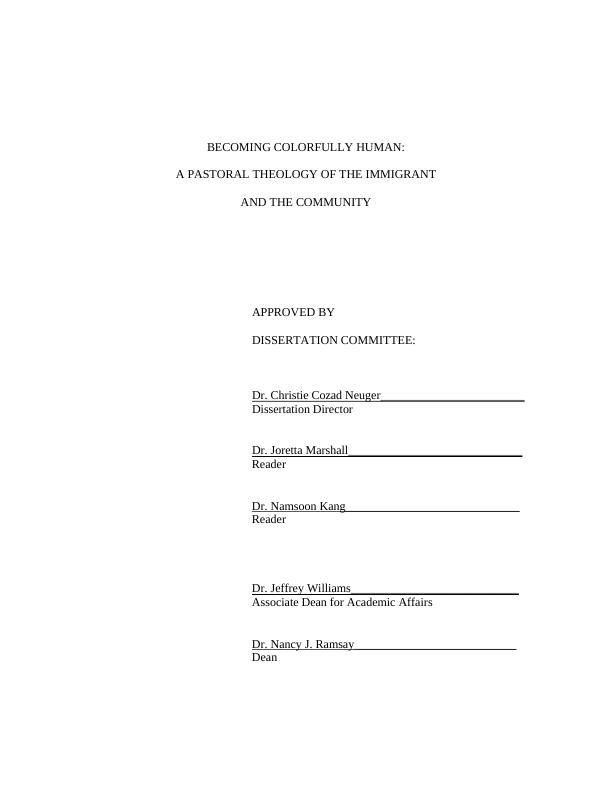Becoming colorfully human: a pastoral theology of the immigrant and the communityShow full item record
| Title | Becoming colorfully human: a pastoral theology of the immigrant and the community |
|---|---|
| Author | Kim, Peter Sungjin |
| Date | 2011 |
| Genre | Dissertation |
| Degree | Doctor of Philosophy |
| Abstract | Developing hermeneutical models that critically inform the discussion of immigration by perceiving immigration through the vantage point of human identity, agency, and relationality could be important for promoting a balanced approach to the public discussion on immigration. A pastoral theology of the immigrant and the community as a public theology was utilized to delineate more ethical and inclusive values and practices in the relationship between local and immigrant populations. The lived experience of Korean immigrants was researched and examined in the study. The research data came from the life stories of Korean immigrants via case studies, in-depth interviews, and a survey of biographical materials, historical documents, and works of literature regarding Korean immigrants in the U.S. The findings from the collected data were brought into conversation with other sources in theology and social sciences to create a pastoral theology of the immigrant and the community.^Victor Turner's theory of liminality and the concept of marginality found in two Korean American theologians, Jung Young Lee and Sang Hyun Lee, were brought into an interdisciplinary conversation with the Korean concept of human interrelatedness in Cheong to elaborate and clarify the human in the Korean immigrant. The study also examined the feminist theologian Letty M. Russell's ideas of partnership and hospitality in exploring the concept of a responsible neighbor. A constructive proposal in theological anthropology that viewed mobility, fluidity of identity, and acceptance of the other as life-forming, life-enriching, and life-sharing principles for a God-intended design of human existence was provided.^Various cultural sources informing immigration and the Christian tradition of receiving the stranger including Jesus' spirituality of hospitality were framed by the hermeneutic of co-authoring between the immigrant and the local as ethically and relationally responsible neighbors and "blessed guests." Pastoral care practices that could ameliorate the immigrant's pain through advocacy and empowerment were suggested. The church as a social and religious institution was challenged to rediscover the biblical mandate of Jubilee, become an active protector of the immigrant, and a willing mediator of intercultural encounters. |
| Link | https://repository.tcu.edu/handle/116099117/4323 |
| Department | Brite Divinity School |
| Advisor | Neuger, Christie Cozad |
Files in this item
This item appears in the following Collection(s)
- Doctoral Dissertations [1487]
© TCU Library 2015 | Contact Special Collections |
HTML Sitemap



